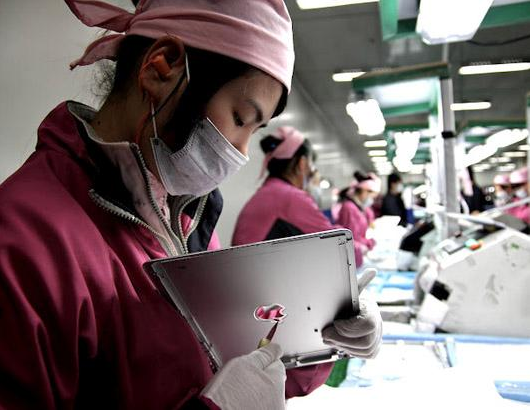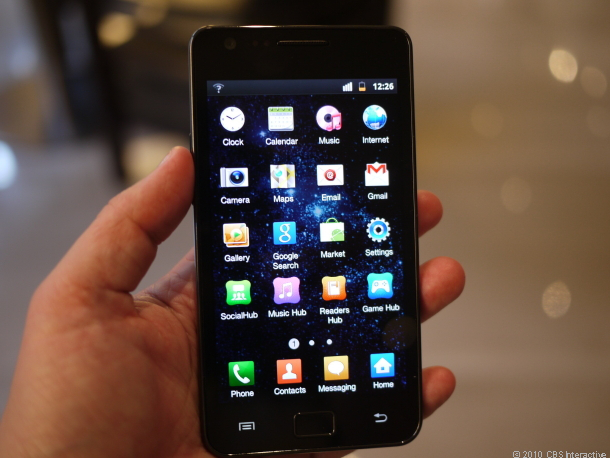Briefly: Apple corrects 'Nightline'; Kodak ITC suit; Samsung Galaxy S II hits 20M
iFactory
"iFactory: Inside Apple" aired late Tuesday night and was widely reported as containing few real surprises. Throughout the 30-minute broadcast, reporter Bill Weir toured facilities and interviewed Foxconn workers, as well as executives at the company and the Fair Labor Association.
ABC News reported on Wednesday that Apple, Foxconn and the FLA each responded to the report with their own corrections and clarifications.
In particular, Apple took issue with the translation of a worker's response that she processed 6,000 units per day in her role.
“In manufacturing parlance this is called deburring. Her line processes 3,000 units per shift, with two shifts per day for a total of 6,000. A single operator at Ms. Zhou’s station would deburr 3,000 iPads in a shift,†Apple said in a statement.
The company attributed the confusion to a mistranslation, asserting that it was impossible for the worker to work back-to-back 12-hour shifts and stay on for her next day's shift, effectively working 36 hours straight.
Foxconn workers "deburr" the Apple logo on an iPad component. | Credit: Almin Karamehmedovic/ABC News
Foxconn spoke up to correct the accusation that starting pay at Foxconn is too low for payroll tax withdrawal.
“We have over 75 percent of the employees in the category of earning at least 2,200 RMB ($349/month) basic compensation standard. That means they are earning 13.75 RMB ($2.18) per hour. If they work overtime on the weekend, they will earn 27 RMB ($4.28) per hour. In order to reach 3500 to be taxable, they will have to work 47 OT hours to reach 3,500,†the company said.
“If the overtime hours are in weekdays, they have to work around 63 hours per month to reach that level of salary to be taxable,†the statement read, adding that the assertion is only true "when applying to the entry-level workers while over 75 percent are already over the probation and earning more than 2,200 RMB basic salary.â€
Foxconn responded to criticism last week by promising wage increases of between 16 to 25 percent for its workers.
Fair Labor Association president Auret van Heerden told ABC News that discussions with Apple to join the association began in April 2007. They eventually broke down in March 2008, but were picked back up when the FLA did some pilot survey work for the company.
"That pilot led to a second activity that I believe contributed to the decision to join the FLA at the end of 2011. I, of course, cannot speak for Apple but I do believe that the decision to join was probably taken some months before (and therefore well before) The New York Times articles.â€
The Times caused a stir last month when it published a report citing several anonymous former Apple executives who claimed Apple was aware of egregious labor rights violations within its supply chain but chose to ignore them.
Apple announced that it was joining the FLA last month with the release of its annual supplier responsibility report. Inspections from the FLA began last week, with van Heerden declaring that conditions at Foxconn were better than average. However, one non-profit organization claims Foxconn management were "prepared" for the inspections and tried to hide away violations that would have been flagged. van Heerden has said he expected the manufacturer to put on a show and committed the organization to doing a "bottom up" assessment to ferret out any violations.
Kodak
Even as the once-mighty photography giant is fighting for survival after filing for chapter 11 bankruptcy protection, Kodak will have another chance to milk its intellectual property for settlement money.
The ITC announced Wednesday (via Bloomberg) that it would look into a complaint filed by Kodak against Apple and HTC on Jan. 10, 2012 over patents related to image transmission. Apple's iPad and iPhone are named in the suit, as well as HTC's Flyer tablet and Wildfire S phone.
The case will proceed while Kodak's patents are expected to eventually make their way to the auction block as part of the bankruptcy proceedings. Apple has actually asked permission from the bankruptcy court to sue Kodak, alleging further patent infringement beyond cases it has already brought against the company. Meanwhile, a ruling on the original Kodak ITC lawsuit against Apple has been postponed until late this year.
Samsung Galaxy S II
South Korean electronics maker Samsung announced a milestone on Thursday, touting 20 million unit sales of its Galaxy S II smartphone in less than a year, Reuters reports. Samsung's last-generation Galaxy S handset reached 22 million in sales since the device was launched in 2010, the company's statement also noted.
The company has been relatively tight-lipped about smartphone unit shipments in recent quarters, leaving analysts scrambling to generate estimates to compare it against rival Apple. Market research firm IDC said earlier this month that it believes Samsung sold 94 million smartphones last fiscal year and more than 30 million alone in the December quarter.
Buoyed by the international success of its iPhone 4S, Apple saw record iPhone sales of 37 million units in the December quarter. For calendar 2011, Apple had a total of 93 million iPhones sold, ending up just behind estimates of Samsung's tally for the year.
The fierce competition between Apple and Samsung has spread to the courtroom, as the two companies are locked in a tense disagreement over patents. Apple has, in fact, targeted the Galaxy S II in some of its lawsuits, asking courts to ban sales of the allegedly infringing device.
Samsung has also fought back with a series of television ads that mock customers waiting in line for a new iPhone. The company even purchased highly-coveted Super Bowl commercial space to downplay the iPhone and promote the U.S launch of its Galaxy Note hybrid phone/tablet.
 Josh Ong
Josh Ong












 Malcolm Owen
Malcolm Owen
 William Gallagher and Mike Wuerthele
William Gallagher and Mike Wuerthele
 Christine McKee
Christine McKee
 William Gallagher
William Gallagher

 Marko Zivkovic
Marko Zivkovic









